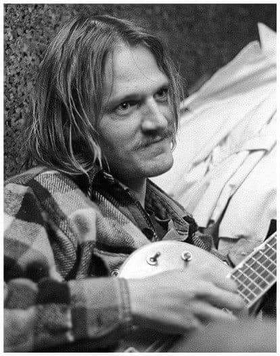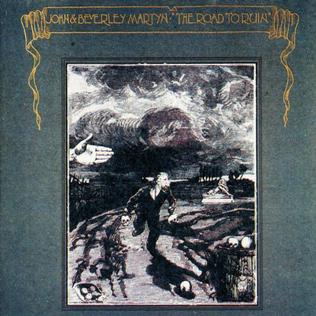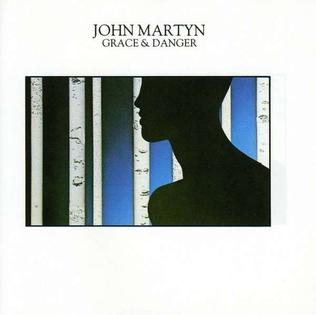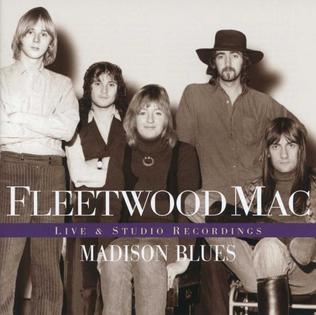
Iain David McGeachy, known professionally as John Martyn, was a British singer-songwriter and guitarist. Over a 40-year career, he released 23 studio albums and received frequent critical acclaim. The Times described him as "an electrifying guitarist and singer whose music blurred the boundaries between folk, jazz, rock and blues".
"Scarborough Fair" is a traditional English ballad. The song lists a number of impossible tasks given to a former lover who lives in Scarborough, North Yorkshire. The "Scarborough/Whittingham Fair" variant was most common in Yorkshire and Northumbria, where it was sung to various melodies, often using Dorian mode, with refrains resembling "parsley, sage, rosemary and thyme" and "Then she'll be a true love of mine." It appears in Traditional Tunes (1891) by Frank Kidson, who claims to have collected it from Whitby.

Danny Ray Whitten was an American guitarist and songwriter, best known for his work with Neil Young's backing band Crazy Horse, and for the song "I Don't Want to Talk About It", a hit for Rod Stewart and Everything but the Girl.

Farewell, Angelina is the sixth studio album by American folk singer Joan Baez, released in late 1965. It peaked at #10 on the Billboard Pop Albums chart.

Liege & Lief is the fourth album by the British folk rock band Fairport Convention. It is the third album the group released in the UK during 1969, all of which prominently feature Sandy Denny as lead female vocalist, as well as the first to feature future long-serving personnel Dave Swarbrick and Dave Mattacks on violin/mandolin and drums, respectively, as full band members. It is also the first Fairport album on which all songs are either adapted (freely) from traditional British and Celtic folk material, or else are original compositions written and performed in a similar style. Although Denny and founding bass player Ashley Hutchings quit the band before the album's release, Fairport Convention has continued to the present day to make music strongly based within the British folk rock idiom, and are still the band most prominently associated with it.

Bless the Weather is a 1971 album by John Martyn and marks his return as a solo artist having released two albums with his wife Beverley Martyn. The writing reflects their move from London to Hastings Old Town. When it was released it garnered his best reviews to date, and remains a firm favourite among fans, featuring such standards as "Head and Heart" and the title track. The album is predominantly acoustic, although it does feature Martyn's first real 'echoplex track' in "Glistening Glyndebourne".

Inside Out is an album released in 1973 by British singer-songwriter John Martyn. His fifth solo album, it was also his most experimental, and the jazziest album in his catalog. The album features two that are favourites with his fans, "Fine Lines" and "Make No Mistake", as well as two songs that he enjoyed playing live as jazz epics, "Outside In" and "Look In".

London Conversation is the first album by John Martyn, released on Island Records in 1967. Largely self-penned, the album is much more folk oriented than his blues/jazz tinged later releases. Recording was completed by 9 August and the album was released when Martyn was 19 in October 1967. The album reputedly cost £158 to record. The cover photo was taken by Barry Wentzel on the roof of Island Records boss Chris Blackwell's flat in Cromwell Road, London.

The Road to Ruin is a 1970 album released by husband and wife John and Beverley Martyn. It was the second album released as a duo. Island Records persuaded John Martyn to resume his solo career as they believed that the public was more interested in John as a solo artist rather than as part of a duo. The album marked the first collaboration on record between John and bassist Danny Thompson, who featured on many of Martyn's subsequent recordings.

Live at Leeds is a live album by John Martyn. He independently released this album himself in an initial run of 10,000 that were numbered and signed, after a disagreement with Island about its commercial viability. The working title was "Ringside Seat"; photos of Martyn and bassist Danny Thompson in a boxing ring were taken for a prospective cover, though never used. It was recorded on 13 February 1975, at Leeds University, at the same venue that The Who recorded their Live at Leeds in 1970.

One World is the seventh studio album by Scottish guitarist and singer John Martyn, released in November 1977 by Island Records. The album, produced by Island owner Chris Blackwell at his Berkshire farm, was recorded with myriad musicians, including Steve Winwood, Danny Thompson, John Stevens, Hansford Rowe and Rico. The album followed a sabbatical where, at Blackwell's invite, Martyn holidayed in Jamaica in 1976 with his family, having become disillusioned with the music business. The trip helped revitalise his interest in music.

Grace and Danger is the eighth studio album by John Martyn, released on October 13, 1980 by Island Records.

Jefferson Airplane Loves You is a three-CD boxed set of recordings by the San Francisco rock band Jefferson Airplane with extensive liner notes by Jeff Tamarkin, author of the Jefferson Airplane history Got a Revolution: The Turbulent Flight of Jefferson Airplane.

The Apprentice is a rock album by John Martyn. Recorded at CaVa Studios, Glasgow, Scotland. Originally released on CD by Permanent Records, catalogue number PERM CD 1.

The Woodstock Experience is a box consisting of a set of studio albums and live performances from the 1969 Woodstock Festival by the artists Santana, Janis Joplin, Sly and the Family Stone, Jefferson Airplane, and Johnny Winter. Each set consists of the 1969 studio album by the artist as well as each artist's entire Woodstock performance. The set was released as both a box containing all five artists, and also as individual releases separated by artist, each containing the studio album and live performance of that artist.

Ain't No Saint is a career-spanning retrospective of folk musician John Martyn, released on the eve of the singer's 60th birthday in 2008.

The First of the Irish Rovers is the debut live album by the Canadian Irish folk band The Irish Rovers, released in 1966. The album title reflects the last line in the song "The Irish Rover", from which the group took its name.

Now You See Me, Now You Don't is the 25th studio album by Cliff Richard, released in August 1982. The album is largely a mix of lightly veiled and more overtly gospel-message tracks, together with a few non-gospel tracks. It reached No. 4 in the UK Albums Chart, No. 1 in Denmark, No. 21 in Australia and No. 19 in New Zealand. It was certified Gold in the UK.

Madison Blues – Live & Studio Recordings is a compilation album by British blues rock band Fleetwood Mac, released in 2003. It is a compilation of BBC session tracks and live concert material from the band's second post-Peter Green lineup, none of which had previously been officially released.

On Broadway: Act One – October 28th, 1987 is a three-CD live album by the Jerry Garcia Band and the Jerry Garcia Acoustic Band, two music groups led by Grateful Dead guitarist and singer Jerry Garcia. It contains three complete sets of music, recorded at the Lunt-Fontanne Theatre in New York City on October 28, 1987. It was released by ATO Records on June 23, 2015.


















